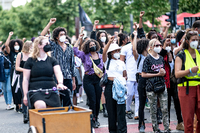The Black Lives Matter movement in four E.U. countries
Der Tagesspiegel
Berlin, Germany
2021-07-12
Andrea Dernbach
Graciously translated from German into English for me by Gyavira Lasana.

Black Lives Still Matter: Dass das Leben Schwarzer Menschen weiterhin zähle, war der leicht variierte Titel einer Demonstration. FOTO: FABIAN SOMMER/DPA |
The short summer of BLM—and what remains of it. The results varied, but everywhere #blm influenced the debate on racism, says a European study. A comment.
A year has now come and gone since the protests that drove hundreds of thousands onto the streets after the death of the black US citizen George Floyd—and not just in the USA. In Germany, by the end of July 2020, around 200,000 people had demonstrated against racism in their own country, through police, discrimination in public services and against the gauntlet that is their everyday life for the majority of non-white people.
Forgot everything? The last demonstration at the Brandenburg Gate brought just a thousand people, despite relaxed pandemic regulations. Media interest in “Black Lives Matter” also quickly subsided after initial widespread coverage, as a group of researchers from Germany, Poland, Italy and Denmark who investigated the phenomenon a year later for their respective countries have noted.
But this only seems to be the surface when you read what the social scientists from the German Center for Integration and Migration Research in Berlin, the Scuola Normale Superiore in Florence, the University of Copenhagen and the Polish Academy of Sciences have compiled in interviews with activists, media analysis and on four maps of protest. In all countries, the short #blm summer has made racism as a topic more visible and black voices more audible than ever.
In Poland protest only in the cities
Even if, as quoted in the research report, it had to be made clear to the enthusiastic newcomers that the black movement in Germany has existed for more than forty years and not merely since May 25, 2020. Now having gained momentum and publicity, anti-racism became, according to the report, “like never before a political topic.” Even for Poland, where the protests were relatively small—limited to major cities such as Warsaw, Kraków, Wroclaw and Katowice—and failed to include outrage over government actions against women’s and gay rights, Black Lives Matter nonetheless made racism a public issue.
Particularly interesting is the comparative view of the two countries with both fascist and colonial pasts: In Italy as well as in Germany, the #blm protests reached the whole country, and both movements related racism to their nations’ past. In the media, on the other hand, and possibly beyond there was resistance to the connection of today’s racism with national history. According to the analysis of the team from Florence, even Italy’s left-liberal and left-wing traditional newspapers have dealt with the US protests in far more detail than with those in Europe and Italy. Even the left-wing Il Manifesto has interpreted the slogan “I can’t breathe,” whispered by the dying Georg Floyd, not as a call against anti-black racism but a jingo for the many who suffered from shortness of breath owing to the pandemic, the climate and the economic crisis.
Racism is often that of “others”
In Germany, the news daily Bild had virtually concealed the topic. The narrative that minorities have been wanting to blow up for decades—that racism has been successfully overcome together with fascism and Nazism—still seems resilient. The editors of Bild had decided that a racist status quo in Germany was not something its readership wanted to see, hear, or read. Interestingly, Alle außer mir, Francesca Melandri’s excellent novel about Italy’s racist Abyssinian War against Ethiopia and its consequences sold 70,000 copies in Germany in one year, while selling over the counter just 10,000 times in Italy. Racism is preferably that of others.
The two countries are also far apart in terms of the response of established politics to #blm. In Italy, the momentum seems to have ebbed before reaching the so-called palazzo, or parliament: “At the political-institutional level, we cannot yet see any effects,” says the research report. In Germany, however, even as BLM was less diverse and counted fewer refugees and fewer active people than in Italy, the movement found exactly the right people for German formal democracy: long-established Afro-Germans with the necessary experience in German politics. For example, they participated in the Chancellor’s Cabinet Committee on Right-Wing Extremism and Anti-Racism, and since then there has also been more money committed black programs and projects.
How long the topic of racism endures at the upper levels of institutions cannot readily be determined. As the researchers also write: For a real verdict on #blm in Europe, a look at the one short summer is too short.


